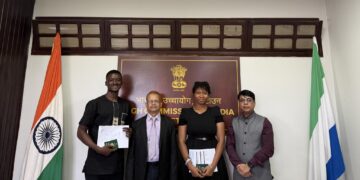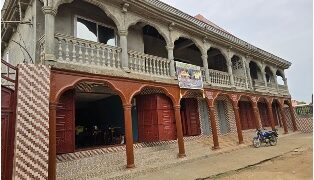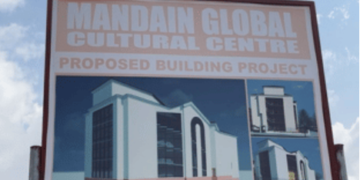By Alpha Amadu Jalloh, Author of “Monopoly of Happiness: Unveiling Sierra Leone’s Social Imbalance”
Finally, the dog is starting to bite its own tail. Journalism in Sierra Leone, once a noble profession tasked with holding power to account and promoting the public good, has increasingly become a paradox, a profession both complicit in undermining the country’s development and, paradoxically, victimized by the very system it enables. The recent banning of journalist Melvin Tejan Mansaray from the precincts of Parliament by the Speaker of Parliament, Hon. Sengepoh Solomon Thomas, is emblematic of this tail-chasing dilemma.
The spectacle of the Speaker, a figure entrusted to uphold democratic principles, brazenly abusing parliamentary power to silence a journalist is deeply troubling. It epitomizes the growing intolerance for dissent and independent thought in Sierra Leone’s political landscape. Mansaray’s ban, justified on grounds of alleged disrespect, not only highlights the fragile egos of those in power but also the absence of accountability mechanisms within our government institutions. Even more disconcerting was the Speaker’s announcement that he would involve the Inspector General of Police in the matter. This is the same police leadership that has repeatedly shown a willingness to act as an enforcer of political directives rather than an impartial guardian of justice.
But before we rush to defend the press as a victim, we must also confront the uncomfortable truth: journalism in Sierra Leone has, in many ways, set itself up for this predicament. The industry is riddled with ethical lapses, compromised professionalism, and a lack of expertise.
For too many Sierra Leonean journalists, journalism is not a calling but a last resort, a job taken up out of desperation. The result is an industry filled with individuals who lack both the qualifications and the moral grounding to uphold the principles of the profession. Journalism, in its true form, demands integrity, balance, and a commitment to uncovering the truth, no matter the cost. Yet, what we often see is far from this ideal.
The absence of formal training and adherence to journalistic ethics has created a space where bias and sensationalism flourish. Many journalists are easily swayed by money or political favors, becoming mouthpieces for whichever entity offers them the most benefit. This has led to a culture of sycophancy, where journalists praise and pamper government officials rather than challenging them or exposing their misdeeds. In this environment, stories are frequently published with little regard for balance, accuracy, or public interest.
Melvin Tejan Mansaray represents a microcosm of this broader crisis. While Mansaray has demonstrated potential as an emerging journalist, his work has not been free from bias. For example, in his analysis of the controversies surrounding the former auditor general and her deputy, he was accused of partiality. These instances have led many to question his objectivity and credibility.
However, Mansaray’s flaws as a journalist do not justify his treatment by Parliament. The government, historically an unreliable partner to the press, seems to believe it can buy allegiance while silencing criticism. The banning of Mansaray and the implicit threat of police action serve as a chilling reminder of how quickly the state resorts to authoritarian tactics when its interests are challenged.
The Sierra Leone Association of Journalists (SLAJ) has been largely ineffective in addressing these challenges. While SLAJ has issued occasional press releases condemning abuses against journalists, these statements are seldom followed by meaningful action. The association often resorts to backroom negotiations to resolve disputes rather than standing firmly to defend its members.
This toothless approach emboldens the government and other powerful actors to continue their mistreatment of journalists. SLAJ must transform itself from a passive observer to an active defender of press freedom. This requires not just issuing statements but also providing legal support, advocating for policy reforms, and ensuring that journalists have access to the training and resources they need to uphold their profession’s highest standards.
Sierra Leone’s journalism landscape is in dire need of specialization. To provide the public with balanced, informative, and impactful reporting, journalists must develop expertise in fields such as law, finance, health, technology, and social issues. Without this specialized knowledge, reporting often lacks depth and fails to hold those in power accountable.
For instance, the Auditor General’s reports, critical documents detailing government financial mismanagement, are rarely dissected in a way that educates the public or spurs meaningful action. Instead, coverage is often superficial or skewed by political bias. Similarly, issues such as public health crises, economic policy, and technological advancements receive minimal attention because few journalists have the expertise to cover them effectively.
The relationship between the government and the media in Sierra Leone is a textbook example of mutual exploitation. The government uses financial incentives and access to manipulate journalists, while some journalists exploit their platform to serve personal or political agendas. This cycle of complicity undermines the credibility of the press and erodes public trust.
Breaking this cycle requires a collective effort. Journalists must recommit to the ethical principles of their profession, prioritizing truth and public interest over personal gain. Media organizations must invest in training and capacity-building programs to ensure their reporters are equipped to tackle complex issues. And the public must demand higher standards from both the press and the government, recognizing that free and independent media is essential for democracy.
The Speaker of Parliament’s actions against Melvin Tejan Mansaray should not go unchallenged. Civil society organizations, SLAJ, and other stakeholders must demand an explanation and call for the protection of press freedom. At the same time, journalists must use this incident as an opportunity for introspection. What does it mean to be a journalist in Sierra Leone today? What role should the press play in a society struggling with corruption, inequality, and underdevelopment?
The metaphor of the dog chasing its tail captures the paradoxical state of journalism in Sierra Leone. The press entrusted with the responsibility of holding power to account has often been complicit in enabling the very abuses it should expose. Meanwhile, the government, reliant on the press to amplify its propaganda, turns on journalists the moment they deviate from the script.
The banning of Melvin Tejan Mansaray from Parliament is not just an attack on one journalist but a symptom of a broader crisis. It reflects a government that fears scrutiny, a media landscape plagued by ethical shortcomings, and a society that has yet to fully grasp the importance of a free and independent press.
For Sierra Leone to move forward, this cycle must be broken. Journalists must rise to the challenge of their profession, government officials must respect the role of the press, and the public must demand accountability from all sides. Only then can we stop chasing our tails and start building a future where truth and justice prevail.






















